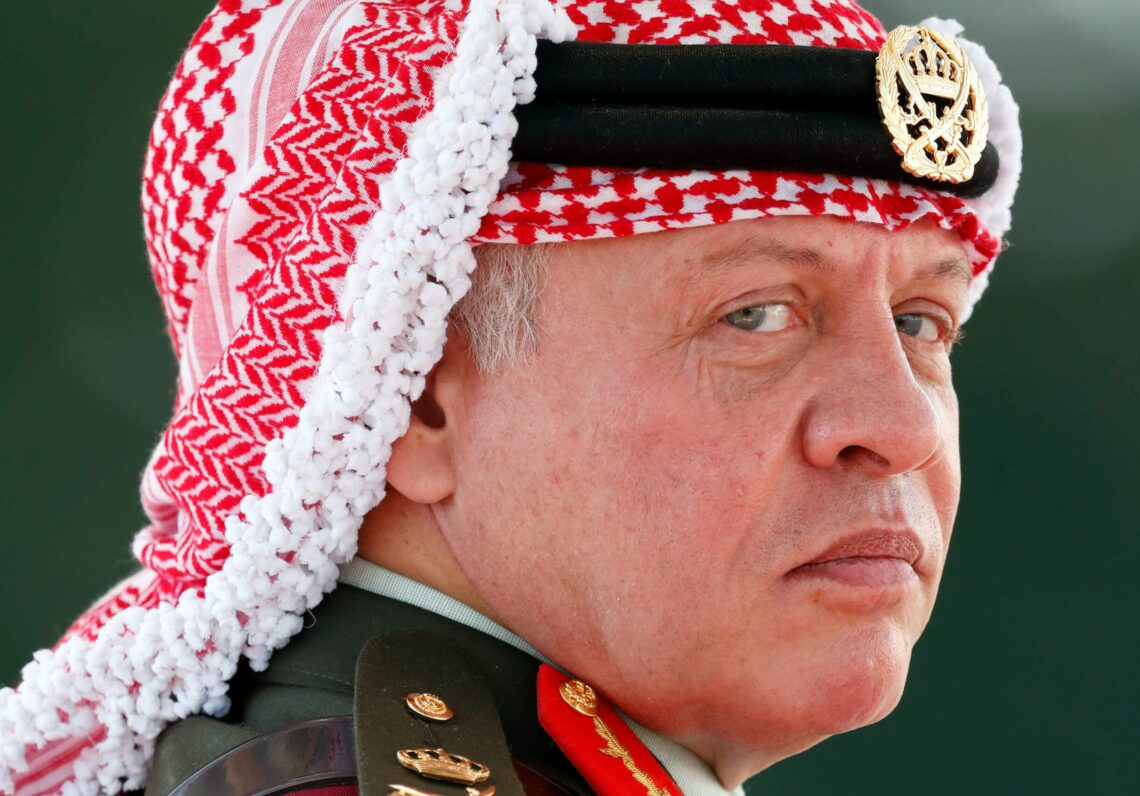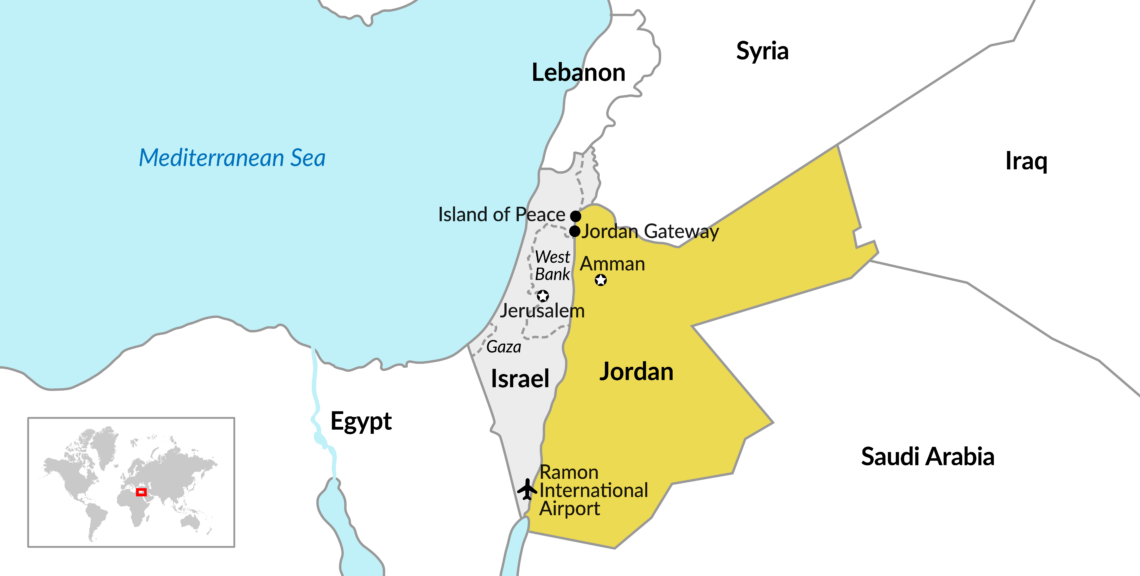Jordan and Israel: What went wrong?
The 1994 peace treaty between Israel and Jordan failed to lead to strong economic ties. However, the two countries are unlikely to turn their back on each other entirely – even amid rising tensions.

In a nutshell
- Relations between Israel and Jordan recently spiraled into a tit-for-tat conflict
- Security cooperation between the countries nevertheless remains strong
- Palestinian elections could complicate the future of the Israel-Jordan peace treaty
In March 2021, an incident brought to light the simmering tensions between Jordan and Israel. Jordanian Crown Prince Hussein Bin Abdullah canceled a visit to the Al-Aqsa Mosque after an argument with Israel over security matters.
In retaliation, Jordan then denied a flight clearance to a plane due to take Israeli Prime Minister Benjamin Netanyahu to a meeting with Emirati Crown Prince Mohammed bin Zayed. The spat left many wondering what remains of the great expectations that followed the 1994 peace treaty between the two former enemies.
Privileged relations
Israel had authorized Crown Prince Hussein to visit the Al-Aqsa Mosque, located in Jerusalem. Under the peace treaty, Jordan enjoys access to Muslim holy sites in the city. A security protocol had been carefully planned by the two countries for the high-profile visitor. Israel was to bear the primary responsibility for ensuring the prince’s safety but he was to be accompanied by a small number of Jordanian bodyguards. However, he arrived at the border with 50 armed guards, which would have made coordination with the Israeli escort impossible. It seems that the prince intended to emphasize the preeminent role of Jordan on the Al-Aqsa esplanade. Israeli authorities wanted to avoid eventual clashes, especially given that in 1951 a Palestinian had assassinated King Abdullah I in the Al-Aqsa mosque because he believed the ruler was going to make peace with Israel.
Jordan relies on Israel for security in the face of growing unrest in the West Bank.
The two sides refused to budge, and the visit was canceled. The following morning Jordan closed its airspace to Prime Minister Netanyahu’s plane, which prevented him from meeting Emirati Crown Prince Mohammed bin Zayed. Israel then briefly closed its airspace to Jordanian aircraft.
The great expectations born of the peace treaty have failed to materialize. True, it resolved long-standing issues. Jordan acknowledged the 1967 Six-Day War loss of the West Bank and East Jerusalem. The Jordan river would mark the international border between the two countries. Jordan was granted privileged access to the Al-Aqsa compound. There were plans for full normalization, close security cooperation, ambitious economic projects, access to ports, an aviation agreement and repartition of waters from regional sources. In addition, Jordan was allocated 55 million cubic meters annually from the Sea of Galilee, later increased by another 10 million cubic meters. There would be a strategic dialogue against terrorism. In short, the agreement was meant to be an example of reconciliation for the region.
It was an open secret that since well before the peace Jordan had been relying on Israel for security in the face of growing unrest in the West Bank. There, Palestinians began establishing military forces in the 1960s and in 1970 attempted a coup against King Hussein with the assistance of Syria. It failed because of Israel’s explicit threats to Damascus, which caused Syrian tanks that had already crossed into Jordan to turn back.
Facts & figures

Many in Israel had believed in the “Jordanian solution.” With its large Palestinian population, Jordan could have become a federation granting a form of autonomy to West Bank Arabs. However, as Palestinian nationalism grew, King Hussein understood this would not come to pass. A year after the 1993 Oslo Accords between Israel and the Palestine Liberation Organization, which established the Palestinian Authority in the West Bank and Gaza, peace between Israel and Jordan was concluded.
The treaty was expected to alleviate a difficult economic situation. Not only would it solve a chronic water shortage; it would also give Jordan access to the sea and improve its relations with the United States. The beginnings were promising. A joint Qualifying Industrial Zone (QIZ) agreement with Israel led Washington to exempt Jordan’s industrial exports from taxation. But hopes were quickly dashed, and 27 years later there is limited trade and cooperation between Israel and Jordan. Both bear their share of responsibility for the situation.
Growing distrust
Jordanians of Palestinian origin violently opposed the treaty and reacted angrily to every crisis between the Palestinian Authority and Israel. There is a significant and legally sanctioned presence of the Muslim Brotherhood in Jordan. Its militants lead vocal protests against any manifestation of “normalization,” regularly calling for the Israeli ambassador to be expelled. The Jordanian Bar Association, dominated by the Brotherhood, boycotts Israel and forbids its members to provide legal assistance in drafting commercial deals with that country. The organization and its supporters also opposed an agreement to supply badly needed gas from the Israeli Tamar and Leviathan fields, but King Abdullah signed it nevertheless.
The 45 joint ventures in the Jordanian QIZ fizzled. They had been mostly implemented by Chinese or other foreign companies, which had to bring in Asian technicians because local workers lacked the necessary qualifications. Israeli businesspeople who had been keen at first were also discouraged.
In 2018, King Abdullah declared that relations between the two countries were at their lowest ebb.
Several events deepened antagonism and mistrust. In March 1997, a Jordanian soldier opened fire on a group of Israeli schoolgirls in the Island of Peace on the border, killing seven and badly injuring six. Though King Hussein took the unprecedented step of making condolence calls to the families of the victims, there was an outpour of support for the soldier among Israel’s opponents in Jordan. The man escaped the mandatory death penalty and was given a hero’s welcome in his village when he was released from prison in 2017. In September 1997, Mossad agents were caught in Amman after a failed assassination attempt against Hamas leader Khaled Mashal. In exchange for the agents, an incensed King Hussein demanded the antidote to the drug that had been administered to Mr. Mashal, as well as the release of Sheikh Yassin, founder of the Palestinian Brotherhood branch and Hamas in Gaza. And there were many other such incidents.
Two mega projects, the Red Sea-Dead Sea canal and the Jordan Gateway industrial zone, had been intended to transform the Jordanian economy. The canal was to bring waters 230 meters uphill from the Red Sea to the Dead Sea to prevent the latter from drying up. Also, the investment was supposed to generate electricity for a desalination plant expected to yield 35 million cubic meters of fresh water for Jordanian villages and villages in the Palestinian Autonomy. Environmental concerns about the impact of the project and political bickering have thus far prevented its implementation. The Jordan Gateway Free Zone Industrial Park, straddling both sides of the border, is yet to reach its full potential. Israel did build a bridge between its two parts. Some factories are already functioning on the Jordanian side, but funding for the access road on the Israeli side is still on hold because of Israel’s political crisis.
Jordan will have to tone down its attacks. Israel will have to be more attentive to Amman’s difficult situation.
Plans for a joint airport near the Israeli port of Eilat were abandoned due to reservations from the Israeli security services. Then Israel built Ramon International Airport on its side of the border, infuriating the Jordanians who protested that it endangers one of their airports nearby. Amman adopted a hard line against Israel at the United Nations and other international institutions, which had the added benefit of pacifying the anti-normalization faction at home.
In October 2018, King Abdullah declared that relations between the two countries were at their lowest ebb, blaming Israel’s political situation. In 1994, King Hussein had agreed to lease to Israel for 25 years, to be renewed, the Island of Peace to the north and Tsofar to the south, two sites which had been under Israeli sovereignty and were transferred to Jordan under the peace agreement, so that farmers could keep tending their crops. His son and heir King Abdullah II refused to renew the lease for an additional period.
Scenarios
Security cooperation is still strong; there is an ongoing exchange of intelligence focused on thwarting terrorism. Jordan is fully aware that it is protected by Israel and reciprocates by doing all it can to prevent attacks on its neighbor. Both countries know that it is in their best interest to continue doing so.
There are some important economic projects. Since 2016, gas from the Israeli Tamar offshore field has been supplied to a Jordanian phosphate company under a fifteen-year contract for a total of $700 million. Under a $10 billion, 15-year contract signed in 2018, gas will be supplied to the Jordanian Electricity company from the Leviathan field.
Furthermore, transit agreements between Israel, Jordan and the Gulf states developed during the civil war in Syria, which blocked the land routes. Every year, 15,000 Jordanian trucks carry goods to and from the Gulf states and Turkey via the port of Haifa on the Mediterranean. Many Jordanian workers are employed in Israel, mainly in the hotel industry in Eilat. Border crossings in the south and north are open, and Israelis used to travel to Petra and Amman before the Covid-19 pandemic.
Despite the latest flare-up, common sense is expected to prevail, though both sides will need to work hard to mend fences. They will have to relaunch the Red Sea-Dead Sea canal and the Jordan Gateway industrial park. New initiatives are also called for such as the joint rehabilitation of the Dead Sea and Jordan River, which no longer receives enough water from its upper tributaries. There has been talk of connecting electrical grids; there could also be cooperation on solar energy.
Amman will have to tone down its attacks, while Israel will have to be more attentive to its neighbor’s difficult situation. In a bid to abate the tension, Prime Minister Netanyahu approved a Jordanian request for an additional 3 more million cubic meters of water. Jordan stability is paramount to Israel, which closely follows its difficulties. Amman has to cope with a million and a half Syrian refugees and the regime is under fire for its handling of the full-blown Covid-19 crisis. Recent events in the royal family must be taken as a warning.
The Palestinian conflict is severely affecting Jordan, and unrelenting hostility to the peace treaty could threaten the regime. Palestinian Authority President Mahmoud Abbas has announced that parliamentary and presidential elections are to be held. If they take place, new forces could come into play. On the other hand, the Abraham Accords have shown what can be achieved with political goodwill. The new Israeli government expected to be formed after the March elections could lead to a new beginning, benefiting both countries.








